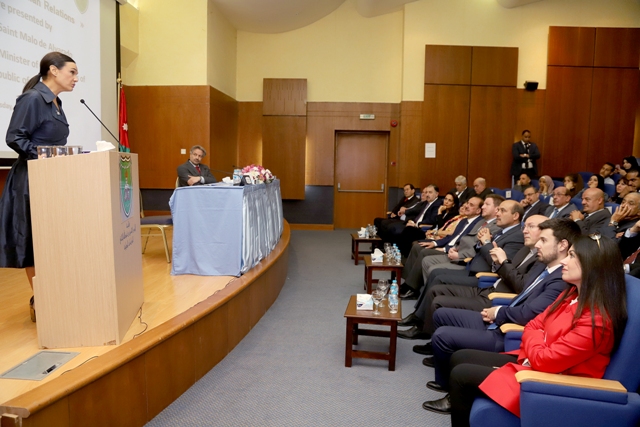 The Vice President and Foreign Minister of Panama Isabel de Saint Malo de Alvarado visited The University of Jordan (UJ) on Thursday, April 4th, and delivered a lecturer at the Prince Al Hussein Bin Abdullah II School of International Studies on the Jordan - Panama relations.
The Vice President said that Panama and Jordan have 25 years of bilateral relations, adding that the two share the values of liberty, respect to diversity, independence, and both play a role in promoting dialogue and peace in their regions.
Regarding His Majesty the King's efforts to reach peace in the region, she said: "I want to recognize in the name of the Republic of Panama, the work His Majesty King Abdullah II and Jordan are doing to reach peace and stability in the region."
"We are both countries committed to dialogue and respect; we are also committed to human rights and humanitarian response," she added.
The top official voiced Panama’s appreciation for Jordan's humanitarian role in hosting around 1.3 million Syrian refugees, a number that "represents an important weight".
Speaking about geopolitical challenge in Latin America, she said that the Venezuela and Nicaragua cases are affecting the region, causing big waves of migration that is "becoming hard to sustain".
De Saint Malo also referred to the commitment of both countries to peace and security; "we are both members of the International Coalition against ISIS," she said.
On outer relations, the VP revealed her country's new strategy - Falcon Policy - to get closer and strengthen relations with the Middle East, Asia, and Africa.
Panama has recently opened its Embassy in Amman in an attempt to strengthening diplomatic ties with the kingdom.
Introducing her country, De Saint Malo said: " Panama is a platform for international trade, a global hub of people, commerce and connectivity, that we call: The Great Connection."
She explained that Panama's valuable geographical location and having the Panama Canal have been strength points for the country's success, especially economic-wise.
In 2016, Panama inaugurated the expanded Panama Canal, "a 66 billion dollars project which is a maritime route that has transformed global trade patterns".
According to her, the Canal is connected to 144 maritime routes and over 17 hundred ports in 160 countries, becoming a major player in global trade.
Throwing a highlight on Panama's economy, De Saint Malo revealed that her country has been one of the fastest growing economies worldwide, recording a 7.2% growth rate between 2001 and 2013.
She added that more than 135 multinational companies have established their regional headquarters in Panama during the past 10 years, as well as international organizations as the United Nations.
She emphasized Panama's commitment to reach the Sustainable Development Goals by 2030, "I am convinced that we need to achieve 2030 agenda. "Each one of the 17 sustainable development goals is required to ensure better days to the future generations," she said.
She pointed out that the 2030 Agenda is a mechanism that goes from local to global, and requires the participation of every sector to ensure that no one is left behind.
The official also stressed that empowering and closing gender gaps are key to achieving the 2030 Agenda for Sustainable Development. "If we still don’t have gender equality by 2030, we will have failed in our efforts to achieve the SDGs," she said.
On its humanitarian role, the official revealed that the country has established a Regional Logistics Center for Humanitarian Assistance, as a regional platform to facilitate efficient management of humanitarian assistance in case of national and international emergencies.
About its Scientific Diplomacy strategy, she said that Panama has decided to have a more active role in promoting and supporting the national scientific sector and expanding its international networks and partners in this regard, referring to her meeting at the Royal Scientific Society with Her Royal Highness Princess Sumaya bint El Hassan, to explore opportunities to cooperate in this area.
The VP also signed two agreements on scientific and academic cooperation with UJ that will certainly contribute to the development of the two country's bilateral relations.
The lecture was attended by UJ President Prof. Abdul Karim Al-Qudah, Dean of the School Prof. Mohammad Al-Qatasha, senior officials at the Panamanian Embassy, ambassadors and diplomats of foreign countries, and a crowd of faculty members and students.
|